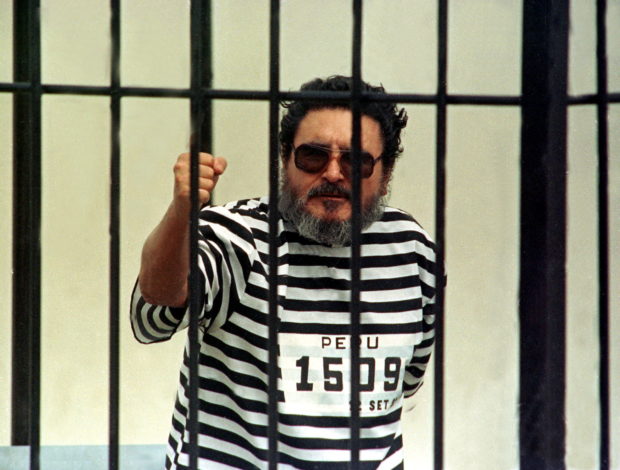Peru to cremate body of Shining Path founder and dispose of his ashes

FILE PHOTO: Shining Path guerrilla leader Abimael Guzman, seen in jail after his capture in Peru, on September 24, 1992. REUTERS/Anibal Solimano
LIMA — Peruvian authorities on Thursday said they had decided to cremate the body of Abimael Guzman, the founder of the Shining Path rebel group that killed tens of thousands of people in the 1980s and 1990s, and spread his ashes in an undisclosed location.
The cremation would end over a week of controversy over what to do with the body of one of Peru’s most reviled figures. Guzman died in prison on September 11 at the age of 86 from an infection while serving a life sentence for terrorism.
Guzman’s widow, Elena Iparraguirre, herself a former Shining Path leader who is also imprisoned, had sought to cremate the body but keep the ashes, a lawyer told Reuters last week.
The lawyer, Sebastian Chavez Sifuentes, did not immediately respond to a request for comment.
Authorities wanted to scatter Guzman’s ashes to avoid a gravesite that could become a rallying point for supporters.
Article continues after this advertisementThe cremation was made possible by a new law, passed on Sept. 16, that allows Peruvian authorities to cremate and dispose of the ashes of those who die after being convicted of terrorism.
Article continues after this advertisementPeru’s attorney general said in a statement announcing the decision that they would dispose of Guzman’s ashes within 24 hours.
Guzman was a former philosophy professor and lifelong Marxist whose Maoist Shining Path group launched a bloody war in 1980 in Ayacucho, an impoverished Andean region, in an attempt to topple the Peruvian state.
The government responded by sending the military to Ayacucho, where officers often struggled to distinguish between peasants and militants.
The result left about 70,000 Peruvians dead, according to a government commission. Over half were killed by the Shining Path, and a third was killed by government forces. Almost half of them were indigenous citizens from Ayacucho.
Guzman was captured in a middle-class neighborhood of Lima in 1992 and had been imprisoned since.